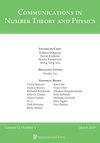Weyl不变量$E_8$Jacobi形式和$E$字符串
IF 1.2
3区 数学
Q1 MATHEMATICS
引用次数: 0
摘要
1992年Wirthmüller证明了对于任何不属于$E_8$型的不可约根系统,在Weyl群下弱Jacobi形式不变的环是多项式代数。然而,最近已经证明,对于$E_8$,环不是多项式代数。Weyl不变量$E_8$Jacobi形式在弦理论中有许多应用,描述这种形式是一个悬而未决的问题。假定具有特定$\eta$-函数因子的$E$-串的标度精化自由能为Weyl不变量$E_8$拟全纯Jacobi形式。进一步观察到,高达$E_4$的一些幂的缩放精细自由能可以写成九个Sakai的$E_8$Jacobi形式和Eisenstein级数$E_2,E_4,E_6$的多项式。在物理猜想的启发下,我们证明了对于索引$t$的任何Weyl不变量$E_8$Jacobi形式$\phi_t$,函数$E^{[t/5]}_4\Delta^{[5t/6]}\phi_t$可以唯一地表示为$E_4$、$E_6$和Sakai形式中的多项式,其中$[x]$是$x$的整数部分。这意味着Weyl不变量$E_8$Jacobi形式完全由一些线性方程的解确定。通过求解线性系统,我们确定了给定索引$t$的Weyl不变量$E_8$弱(分别为全纯)Jacobi形式的自由模在$t\leq 13$(分别为$t\liq 11$)时的生成元。本文章由计算机程序翻译,如有差异,请以英文原文为准。
Weyl invariant $E_8$ Jacobi forms and $E$-strings
In 1992 Wirthmüller showed that for any irreducible root system not of type $E_8$ the ring of weak Jacobi forms invariant under Weyl group is a polynomial algebra. However, it has recently been proved that for $E_8$ the ring is not a polynomial algebra. Weyl invariant $E_8$ Jacobi forms have many applications in string theory and it is an open problem to describe such forms. The scaled refined free energies of $E$-strings with certain $\eta$-function factors are conjectured to be Weyl invariant $E_8$ quasi-holomorphic Jacobi forms. It is further observed that the scaled refined free energies up to some powers of $E_4$ can be written as polynomials in nine Sakai’s $E_8$ Jacobi forms and Eisenstein series $E_2, E_4, E_6$. Motivated by the physical conjectures, we prove that for any Weyl invariant $E_8$ Jacobi form $\phi_t$ of index $t$ the function $E^{[t/5]}_4 \Delta^{[5t/6]} \phi_t$ can be expressed uniquely as a polynomial in $E_4$, $E_6$ and Sakai’s forms, where $[x]$ is the integer part of $x$. This means that a Weyl invariant $E_8$ Jacobi form is completely determined by a solution of some linear equations. By solving the linear systems, we determine the generators of the free module of Weyl invariant $E_8$ weak (resp. holomorphic) Jacobi forms of given index $t$ when $t \leq 13$ (resp. $t \leq 11$).
求助全文
通过发布文献求助,成功后即可免费获取论文全文。
去求助
来源期刊

Communications in Number Theory and Physics
MATHEMATICS, APPLIED-MATHEMATICS
CiteScore
2.70
自引率
5.30%
发文量
8
审稿时长
>12 weeks
期刊介绍:
Focused on the applications of number theory in the broadest sense to theoretical physics. Offers a forum for communication among researchers in number theory and theoretical physics by publishing primarily research, review, and expository articles regarding the relationship and dynamics between the two fields.
 求助内容:
求助内容: 应助结果提醒方式:
应助结果提醒方式:


